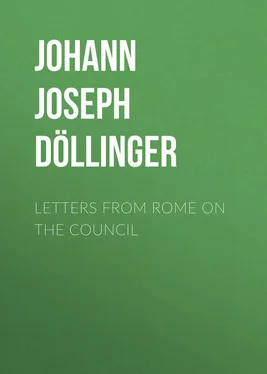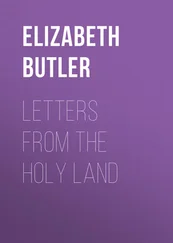Johann Döllinger - Letters From Rome on the Council
Здесь есть возможность читать онлайн «Johann Döllinger - Letters From Rome on the Council» — ознакомительный отрывок электронной книги совершенно бесплатно, а после прочтения отрывка купить полную версию. В некоторых случаях можно слушать аудио, скачать через торрент в формате fb2 и присутствует краткое содержание. Жанр: foreign_antique, foreign_prose, на английском языке. Описание произведения, (предисловие) а так же отзывы посетителей доступны на портале библиотеки ЛибКат.
- Название:Letters From Rome on the Council
- Автор:
- Жанр:
- Год:неизвестен
- ISBN:нет данных
- Рейтинг книги:3 / 5. Голосов: 1
-
Избранное:Добавить в избранное
- Отзывы:
-
Ваша оценка:
- 60
- 1
- 2
- 3
- 4
- 5
Letters From Rome on the Council: краткое содержание, описание и аннотация
Предлагаем к чтению аннотацию, описание, краткое содержание или предисловие (зависит от того, что написал сам автор книги «Letters From Rome on the Council»). Если вы не нашли необходимую информацию о книге — напишите в комментариях, мы постараемся отыскать её.
Letters From Rome on the Council — читать онлайн ознакомительный отрывок
Ниже представлен текст книги, разбитый по страницам. Система сохранения места последней прочитанной страницы, позволяет с удобством читать онлайн бесплатно книгу «Letters From Rome on the Council», без необходимости каждый раз заново искать на чём Вы остановились. Поставьте закладку, и сможете в любой момент перейти на страницу, на которой закончили чтение.
Интервал:
Закладка:
It deserves notice, however, that two months before the opening of the Council the Jesuits had traced out for the Bishops the extent and nature of the freedom they are to enjoy there. They do their part frankly enough in dispelling any illusion on the subject. If any complaint from the Bishops should be heard in Rome, such as was made by the Spanish and French Bishops at Trent, the Curia can reply that they were told all this beforehand. The Civiltà has the most direct sources of information, and may therefore be safely trusted when it says, in a recent number, “We are not the authors of the Papal thoughts, nor does Pius ix. speak and act under our inspiration, but we are certainly the faithful echo of the Holy See .” And, as an echo of the Pope, the Civiltà, in its last number, p. 182, gives a more precise explanation or statement of the infallibility of ex cathedrâ decisions, as extending, not only to all dogmas, but to “all truths and doctrines connected with the various kinds of revealed dogmas, and so to all sentences and decrees concerning the common weal of the Church, her rights and discipline.” In truth, if the Bishops don't even yet see the precipice to the edge of which they have been led step by step for years, and which they are just going to spring into, that is no fault of the Roman Jesuits, who have honestly done what they could to open their eyes. It is therefore to be earnestly wished that the Civiltà may be read and well weighed as widely as possible, for then one may hope they will be “forewarned, forearmed.” They have certainly had no lack of signs and warning voices, who are expected and are willing to subscribe the intended decrees of the Council. “The true echo of the Holy See” proclaims to the world that every Pope is, ever has been, and ever will be infallible, first , when he teaches or maintains anything in any way connected with revealed truths of faith or morals; secondly , when he decrees anything affecting the welfare, rights, or discipline of the Church. Clearly therefore, henceforth the question will be, not in what cases the Pope is infallible, but what are the few cases where he is not infallible. He, as being infallible, will have the first and only right to determine what is the welfare of the Church, and what it requires. And since, in the whole range of public life, of politics and science, there is scarcely anything not permanently or incidentally connected with the weal of the Church, and with its real or assumed rights and discipline, he will have it in his power to make every secular question a Church question. For it must certainly be anathematized as an error, as the Syllabus says, to affirm that the Pope has exceeded the limits of his power. How can he possibly do so on this theory? He is infallible alike in the definition of doctrine and in its application to concrete cases. He is therefore always right in every claim and every decision, and whoever opposes him, or does not at once unconditionally submit, is always wrong. Whatever demand he makes of any State or Sovereign, whatever law or constitution he abrogates, he must at once be obeyed, for he acts for the good of the Church, and he, as being infallible, can alone judge and settle what that is. The episcopate and clergy must blindly submit to his infallible guidance and serve dutifully under his banner, when he proclaims war against a State, or an institution.
Need we explain in detail what painful conflicts with their Governments and the Constitutions they have sworn to, Bishops and clergy, nay all Catholics, might be precipitated into on this system? What caused that lamentable persecution and oppression of Catholics in Great Britain, and their loss of civil privileges for centuries, but Paul v.'s prohibiting their taking the oath of allegiance to their Sovereigns? Although the oath contained nothing against the religious conscience of Catholics, the Pope condemned it because, identifying his own pretensions with the interests of the Church, he thought it intolerable that it denied the power of Popes to depose kings, absolve subjects from their allegiance, and excite revolt and treason against the Sovereign and the State. It is a maxim of the Decretals that no oath against the interests of the Church is binding. 11 11 “Juramentum contra utilitatem ecclesiasticam præstitum non tenet.” – Lib. ii. tit. 24, c. 27; Sext. Lib. i. t. 2, c. 1.
But what is for the benefit of the Church the infallible Pope determines. How often have Popes identified their own political interests with the good of the Church, and required and occasioned the breach of oaths and treaties! Thus Innocent iii. absolved John from his oath to observe Magna Charta, on his consenting to receive back his crown as a gift from him. When, in the fifteenth century, Eugenius iv. was at war with Francis Sforza, and the general Piccinino had promised not to attack him, the Pope absolved him from his promise, because it was prejudicial to the interests of the Papacy, and “a treaty prejudicial to the Church is not binding.” Charles v. and Francis i., in their treaty of Madrid, had stipulated that neither should have his oath dispensed without the consent of the other; but Pope Clement vii. was the first to seduce the King to commit perjury, in order that he might form an alliance with him against the Emperor. So again did Paul iv. release Henry ii. from his five years' truce with Charles v., confirmed by oath, in order to gain the King of France as an ally against Spain.
The Jesuit theory of the infallible Pope and the extent of his powers is in no way less extravagant than that which deluded Agostino Trionfo into his deification of the Pope under John xxii. 12 12 Cf. “Janus,” p. 230.
Once admit the maxim of the Syllabus, that the Popes have never exceeded the just limits of their power, and it must obviously be their right to dispose of crowns and peoples, property and freedom, since they have in fact claimed and exercised the right. Thus, for instance, Nicolas v. did not at all violate the common rights of men, but only made a proper use of his own absolute authority, when he gave full power to King Alfonso of Portugal, and his successors, to subjugate unbelieving nations, appropriate their territories and all their possessions, and reduce their persons to perpetual slavery. Nor was Alexander vi. less justified in conferring on Ferdinand and Isabella of Spain and their successors the newly discovered countries of America, and then drawing the famous line from north to south through the New World, and dividing it between Spain and Portugal. It was to the authority of the Pope, as the lord of all mankind, to whom all men are subject, wherever born, and of whatever religion, since God has subjected the whole earth to his jurisdiction, and made him master of it, that the Spanish conquerors appealed against the natives. On this plea they treated all refusal to submit as rebellion, for which they meant to take vengeance on the natives – as in fact they did in the most horrible manner – by cruel wars, confiscation of property, and slavery. Their lust of conquest, with all the abominations they perpetrated, could always be excused and justified by the remembrance that they were only acting with the sanction of God's earthly representative, and punishing the refusal to recognise his legitimate dominion over the world.
In the article we have cited, the Civiltà affirmed anew, on the authority of the Minorite, Bonaventure of S. Bernardino ( Trattato della Chiesa ), that the Pope can dispose of the whole “Temporali” of kings and princes, their authority and possessions, whenever, in his judgment, the good of the Church requires it. The work of a French writer, Maupied, gives the Fathers of the Society of Jesus the desired opportunity of again commending their Magna Charta – their favourite Bull, Unam Sanctam – as the completest exposition of the relations of Church and State (p. 213): “Fall down on your faces, and adore your lord and master in Rome, who can after his pleasure depose you, deprive you of your rights and bishoprics, and bid you draw or sheathe the sword.” This is a compendium of the teaching the Civiltà addresses to princes and magistrates. If Papal Infallibility is defined by the Council as an article of faith, the whole system is sanctioned, down to its extremest consequences, and the Jesuits will not fail to point to it as proving that their political doctrines also are now approved.
Читать дальшеИнтервал:
Закладка:
Похожие книги на «Letters From Rome on the Council»
Представляем Вашему вниманию похожие книги на «Letters From Rome on the Council» списком для выбора. Мы отобрали схожую по названию и смыслу литературу в надежде предоставить читателям больше вариантов отыскать новые, интересные, ещё непрочитанные произведения.
Обсуждение, отзывы о книге «Letters From Rome on the Council» и просто собственные мнения читателей. Оставьте ваши комментарии, напишите, что Вы думаете о произведении, его смысле или главных героях. Укажите что конкретно понравилось, а что нет, и почему Вы так считаете.












